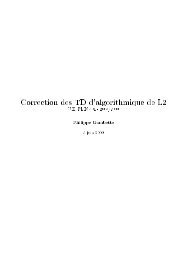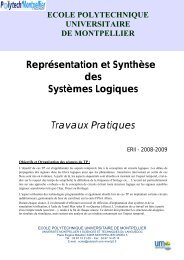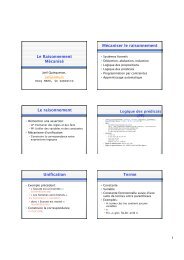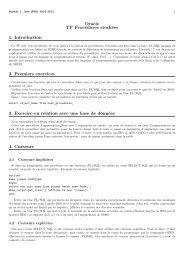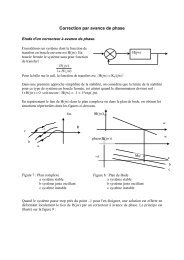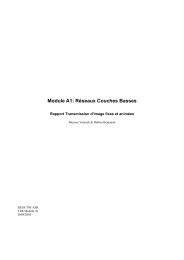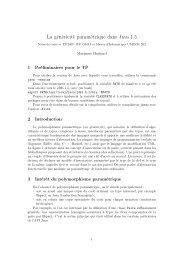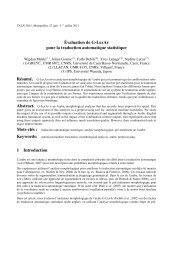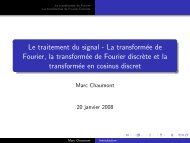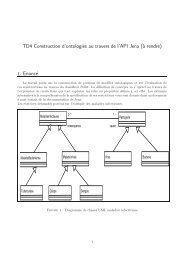Evaluating User Experience in Games: Concepts and Methods - Lirmm
Evaluating User Experience in Games: Concepts and Methods - Lirmm
Evaluating User Experience in Games: Concepts and Methods - Lirmm
You also want an ePaper? Increase the reach of your titles
YUMPU automatically turns print PDFs into web optimized ePapers that Google loves.
190 F. Mueller <strong>and</strong> N. Bianchi-Berthouze<br />
Table 11.1 Summary of case studies, outcomes <strong>and</strong> challenges <strong>in</strong> evaluat<strong>in</strong>g post-play<strong>in</strong>g <strong>and</strong><br />
<strong>in</strong>-place user experience<br />
Case studies Approaches Outcomes Challenges<br />
Table Tennis<br />
for Three:<br />
s<strong>in</strong>gle<br />
condition<br />
Breakout for<br />
two: exertion<br />
vs.<br />
non-exertion<br />
condition<br />
Donkey Konga:<br />
exertion vs.<br />
non-exertion<br />
conditions<br />
Guitar Hero:<br />
exertion vs.<br />
non-exertion<br />
conditions<br />
Semi-structured<br />
<strong>in</strong>terviews,<br />
observations <strong>and</strong><br />
cod<strong>in</strong>g of video<br />
data<br />
Prisoner’s<br />
dilemma <strong>and</strong><br />
questionnaires<br />
Quantitative<br />
comparison of<br />
verbal <strong>and</strong><br />
non-verbal<br />
behaviours<br />
Quantitative<br />
analysis of<br />
movement by<br />
motion capture<br />
system<br />
Exertion facilitates<br />
social play <strong>in</strong> <strong>and</strong><br />
outside game play,<br />
e.g. fosters the<br />
recollection of the<br />
experience<br />
through<br />
k<strong>in</strong>esthetic<br />
stimulation<br />
Exertion stimulates<br />
competition,<br />
connectedness<br />
Exertion facilitates<br />
empathic<br />
behaviour <strong>in</strong><br />
cooperative<br />
games: <strong>in</strong>crease<br />
social <strong>in</strong>teraction<br />
<strong>and</strong> emotional<br />
experience<br />
Exertion facilitates<br />
emotional<br />
experience <strong>and</strong><br />
role-tak<strong>in</strong>g<br />
experience.<br />
Amount of<br />
movement of the<br />
player correlates<br />
with engagement<br />
(a) How to def<strong>in</strong>e<br />
cod<strong>in</strong>g systems?<br />
(b) How to<br />
overcome the fact<br />
that re-enact<strong>in</strong>g<br />
can br<strong>in</strong>g players<br />
to re<strong>in</strong>terpret their<br />
experience?<br />
These measures<br />
overcome the<br />
limitations of<br />
self-reports but<br />
they are <strong>in</strong>direct<br />
How to def<strong>in</strong>e<br />
cod<strong>in</strong>g systems<br />
that produce high<br />
<strong>in</strong>ter-rater<br />
reliability?<br />
The automatic<br />
analysis of<br />
complex<br />
movements (e.g.,<br />
po<strong>in</strong>t<strong>in</strong>g,<br />
shrugg<strong>in</strong>g) is<br />
technically<br />
challeng<strong>in</strong>g<br />
We acknowledge that our approach cannot <strong>and</strong> is not <strong>in</strong>tended to result <strong>in</strong> a comprehensive<br />
list of all available methods, nor describes every aspect of evaluation<br />
specific to exertion games. However, with our approach, we aim to focus on provid<strong>in</strong>g<br />
an experience-based account of what opportunities lie ahead <strong>in</strong> this excit<strong>in</strong>g<br />
new field. We believe our experiences on this topic will give the reader an extensive,<br />
although not comprehensive, view from various perspectives, contribut<strong>in</strong>g to<br />
an underst<strong>and</strong><strong>in</strong>g that can <strong>in</strong>spire <strong>and</strong> guide future <strong>in</strong>vestigations.<br />
11.3 <strong>Evaluat<strong>in</strong>g</strong> <strong>User</strong> <strong>Experience</strong> Post-play<strong>in</strong>g<br />
We beg<strong>in</strong> by describ<strong>in</strong>g evaluation methods that are based on the belief that the game<br />
experience can be (self-)assessed after it has occurred, for example by <strong>in</strong>terview<strong>in</strong>g<br />
the participants immediately after play<strong>in</strong>g. Such approaches have the advantage that




